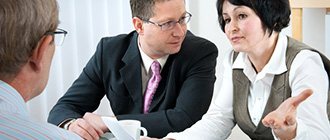The concept of common and joint property of spouses
Based on the key definitions specified in the Civil Code, joint property of spouses is a set of legal norms, the main task of which is to regulate property relations between a married couple and determine the total property mass, the right to dispose of which belongs to them on equal terms.
Based on all legislative definitions, there is no difference between common and joint property; these concepts are completely identical, and have the same functional purpose and legal nature.
However, at the same time, joint ownership does not imply the division of the property mass into separate parts, and the disposal of such property will be carried out by both spouses, based on the principle of good faith or on the basis of agreements between them.
If spouses have a desire to divide their property, then in this case it can be done on a general basis. However, at the same time, conditions will be created under which the property shares will form a common shared ownership.
Legal regime of spouses' property
In order to fully protect the rights and interests of each spouse, the state establishes for them a certain property regime, which regulates the spouses’ responsibilities towards each other and to the property that is in their possession.
The Civil Code of the Russian Federation provides for the existence of two types of legal regime. This is about:
- legal regime, which provides for the presence of personal and common property (in the first case, those values that were owned before the marriage, and in the second - acquired at the moment when family relations were already established between the spouses). Article 35 of the RF IC provides that in case of common ownership of property, its disposal is carried out with the knowledge and permission of both spouses;
- contractual regime, according to which the property legal relations of spouses to each other are regulated by existing agreements. After a divorce, these agreements are automatically nullified and terminated. In addition, this regime provides that spouses can determine the property that will be considered joint and indicate this in marital agreements.
Property acquired during marriage
In order to streamline property legal relations between spouses in the event of their divorce, the state establishes a general rule according to which all material property that was received by a married couple during the existence of their marriage belongs to them on an equal basis, unless otherwise regulated by additional agreements that spouses can enter into agreement with each other.
Thus, property acquired by spouses during marriage may consist of the following elements:
- permanent sources of income from the professional activities of spouses or payments provided to them by public and private funds and financial structures;
- pension payments and benefits from various social funds;
- monetary compensation that is paid to one of the spouses due to loss of ability to work;
- funds that represent material assistance from the state or charitable foundations;
- any movable and immovable property that was purchased with general funds, regardless of who it was registered in the name of;
- property that has a certain value, including shares and other securities, investment contributions to commercial structures and bank savings.
Based on all of the above, we can draw a general conclusion that any valuables that have a material expression and that were acquired at the time when the spouses had already entered into a marriage relationship are common and belong to both spouses in equal shares.
How to protect yourself
In fact, current laws and practice do not allow buyers to protect themselves from the dishonest behavior of sellers who are or are married.
Perhaps the only way to save your money is with title insurance. You pay money to the insurance company, and if legal problems arise after some time, you simply receive an insurance payment.
It is completely unclear, however, why Rosreestr and its officials are needed if citizens still have to deal with their problems on their own. Source.
Types of joint property of spouses
Issues of common property of a married couple directly affect current family and civil law. That is why legal relations between them, based on certain material interests, are regulated in accordance with the current dogmas and norms of these legislative acts.
As a general rule, a married couple has equal rights to those values that they received at the time of marriage. Moreover, even if the official marriage was not registered, property acquired in a civil marriage is subject to fair division if necessary.
However, there are certain nuances that must be considered during the trial. In particular, the court must establish the fact of joint economic activity and obtain evidence that specific values were obtained at the time when the civil marriage relationship existed.
Based on the provisions of Article 34 of the RF IC, the property legal relations of spouses provide for the presence of a certain amount of property that belongs to them on equal rights. This provision determines that the entire mass of material assets, which in the event of divorce is subject to fair and equal division, can be divided into three types:
- spouses' financial resources. These include all benefits received from the state, including social benefits and pension savings, funds that spouses received for performing their official duties at work, bank deposits and investment resources invested in commercial structures;
- real estate, which includes land holdings, as well as residential premises (houses, cottages, apartments, etc.);
- movable property, which includes household items, furniture, equipment, antiques and jewelry, as well as other things that are not classified as personal use (medicines, clothing, etc.).
Required documents
A statement of claim will not be accepted in court on its own. It must be accompanied by a package of documents, the composition of which varies depending on the case under consideration. If the claim being filed is related to the property of the spouses, then the applicant must add to it:
- copies of civil passports of all parties to the process, i.e. plaintiff, defendant. If the case involves children of a married couple who are over 14 years old, then their passports are also required;
- birth certificates of children under 14 years of age, if their interests are also affected by the case under consideration;
- certificate of marriage (divorce);
- documents on the ownership of the property that must be divided;
- certificate from the passport office about family composition;
- conclusions on the value of property from an independent appraiser - a member of the SRO;
- technical passport for the apartment, plan from the BTI;
- consent from the guardianship and trusteeship authorities, if the division of real estate affects the interests of minor children;
- checks, receipts, extracts that can confirm the plaintiff’s case;
- receipt of paid state duty.
The presented list can be expanded with any documents if the plaintiff assumes that these will help defend his point of view in court.
Possession, use and disposal of common property of spouses
Considering the fact that property assets that were received during marriage belong to both spouses on an equal basis (unless otherwise provided by agreements between them or by law), the right to dispose of them must occur with the knowledge of both spouses.
Article 35 of the RF IC establishes that any actions related to the use of specific property can be carried out by spouses only in situations where the second spouse knows about it in advance. This rule is also supported by the provisions of Article 235 of the Civil Code of the Russian Federation, which establishes approximately the same rules for the disposal of property assets.
In accordance with the current rules, it is automatically considered that the second spouse has been informed in advance regarding the actions that apply to the first spouses in relation to the property. If he does not know about the peculiarities of the disposition process, and does not agree with the second spouse, he has the right to annul all property transactions in court.
Property acquired in a civil marriage
Increasingly, adult men and women prefer to run a joint household without registering their relationship. In order to protect their rights and interests, the state establishes that the right of common joint property of spouses also applies to this category of civil legal relations.
After the breakup of civil relations, partners can organize the division of the property that they acquired at the time of their cohabitation. However, there are some features that need to be taken into account.
In particular, among the factors that take an active part in the division of property of common-law spouses, we can highlight:
- contribution of each spouse to the purchase of property in monetary terms (Article 244 of the Civil Code of the Russian Federation);
- proof of the fact of living together (testimony of neighbors, mutual friends, etc.);
- availability of documentation regarding the financial status of each of the common-law spouses, including information about their income.
Arbitrage practice
The practice of making court decisions in cases of division of real estate is very diverse.
But if we compare the results, it turns out that more than 70% of them lead to an equal division of property between spouses. For a judge to depart from this principle, the interested party must provide very strong documentary evidence. Little evidence is taken into account in this matter. Having decided to delineate ownership rights to real estate after divorce, former spouses should be prepared for the fact that this process can significantly extend over time. Allocating shares in an apartment during a divorce in 2020 requires studying a large number of documents. Therefore, the parties can be advised not to delay this procedure too much, since they have decided to separate.
Division of property acquired during marriage
In a situation where a married couple decides to end their relationship and dissolve their marriage, the right of common joint property of the spouses comes into force in relation to their property interests, which provides that all material assets received during the marriage must be distributed equally between the spouses parts.
The key provisions of the Civil Code and the Insurance Code establish that the total property mass is divided equally, but in some cases it may not be distributed in equal parts. For example, this will happen in a situation where one of the spouses did not make any contribution to the family budget and lived off the income of the second spouse.
Experts say that the division of marital property is a complex category that requires special attention and a good nervous system.
In order to distribute property as efficiently as possible, it is necessary to draw up a general list of it, as well as determine the shares of contributions of each spouse in it, if there are conditions under which an equal division would be unfair.
It is also worth noting that this issue can be resolved either peacefully or in court. However, in the vast majority of cases, it is the courts that are forced to make final decisions.
Real estate situation
The same problem can be encountered when buying real estate. Here, for example, is one of the recent cases considered by the Supreme Court:
The husband received an inheritance, after some time he sold it, and with the proceeds an apartment was purchased and registered in his wife’s name. The Supreme Court came to the conclusion that since the apartment was bought with the husband’s cash, then it belongs to him, and it doesn’t matter that the apartment was purchased during marriage, and in the contract and the real estate register only the wife is indicated as the owner.
It is also good that a dispute arose between the spouses. Imagine if my wife managed to sell this apartment, you won’t envy that buyer.







